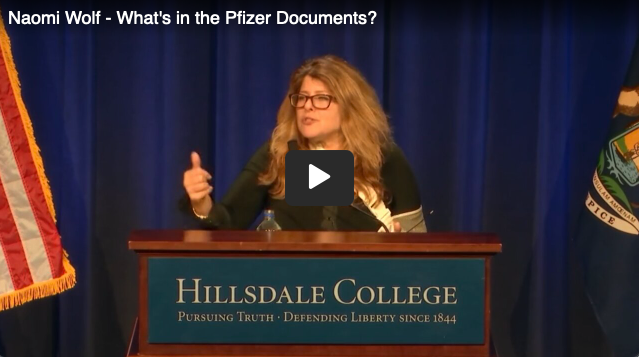
Bloomberg is anticipating (or perhaps suggesting) this angle as the “likely challenge” to Biden’s vaccine mandate via OSHA, altogether ignoring other reasons.
Biden’s Vaccine Mandate and the Likely Legal Challenge – YouTube
“In this particular instance the Occupational Health and Safety Administration is mandating this vaccine and testing requirement through an Emergency Temporary Standard. The tradeoff there is that they have to reach a higher standard. Legally what they have to show is that its necessary to protect workers against a grave danger.”
I recently discovered a Congressional Research Service paper discussing the government’s vaccine mandate authority and critically reviewed it as a lay person. Based on recent federal policy and executive actions, the subject document appears to be the Biden administration’s reference playbook. As the line is used frequently on YouTube, “I am not an attorney, nor am I your attorney.” Review of Wen W. Shen’s paper, State and Federal Authority to Mandate COVID-19 Vaccination, published April 2, 2021, (as attached), suggests government vaccine mandates are, quite simply… unconstitutional and immoral.
The Congressional Research Service legislative attorney, Wen W. Shen, writes, “In the early part of the 20th Century, the Supreme Court twice considered constitutional challenges to state vaccination mandates. Each time, the Court rejected the challenges and recognized such laws as falling squarely within the states’ police power.”
If the power to mandate vaccines is so clear cut, and states are so confident in their ability to mandate vaccination, why, as Shen suggests, do states prefer to almost exclusively, and somewhat gingerly, depend on conditional practices for implementation? These conditional practices can easily be viewed as coercive and akin to extortion in cases where such conditions result in an individual’s total financial ruin like, for example, a permanent job lay-off during a pandemic suffering from excessive government mandates and regulation.
Soft mandates, as these conditional practices might be coined, and as Shen aptly identifies, are most easily forced on non-voters (children of parents who are often themselves in the position of sending their children to school to support the most basic living for their families). Shen writes:
As discussed above, existing vaccination mandates—as they are typically structured—generally do not interfere with the medical informed consent process and an individual’s right to refuse in that context. Rather, they impose secondary consequences—often in the form of exclusion from certain desirable activities, such as schools or employment—in the event of refusal. Put another way, mandates generally do not require involuntary vaccination, but instead impose consequences on individuals who refuse to get vaccinated.
Shen continues, “Under the lenient rational basis review, courts have held that ‘the right to free exercise of religion . . . [is] subordinated to society’s interest in protecting against the spread of disease.’” This view, however, seems sharply inconsistent with the concept that the Constitution – ie. our inalienable individual rights to life, liberty, and the pursuit of happiness (limited government, just powers from the consent of the governed, the Bill of Rights and other amendments); documents that can perhaps most appropriately be recognized as the foremost supreme federal law – supersedes state law, and therefore, suggests freedom of religion is not subordinate to a state or local duty to general public health and welfare.
“This case has to do with religious and medical exemptions. It doesn’t cover not wanting to take an experimental, still unapproved, vaccine, which is still under Emergency Use Authorization. Nor about them extending the expiration date for the vaccines by three months.”
As recently as today, in speaking to federal vaccine mandates, White House press secretary Jen Psaki expressed the opinion that federal law supersedes state law. This statement is a clear and obvious attempt to obfuscate the public and public discourse surrounding vaccine mandates. The effort suggests that the Biden Administration knows its policy positions on vaccine mandates is weak, at best.
White House on Vax Mandates: ‘Federal Law Overrides State Law’ (theepochtimes.com)
“Health” and “Public Health” are not expressly enumerated in the constitution as a federal power. So, how does clearly unconstitutional federal law and an equally unconstitutional federal agency legally justify federal vaccine mandates? As a federal entity with no constitutionally enumerated public health powers, does the FDA or CDC hold any legitimate authority in the legal debate over vaccines and vaccine mandates?
The judicial branch seems to have grossly permitted the legislative and executive branches to run amok in the area of health. As we dig in, the matter becomes more and more convoluted. The matter may, however, be simply resolved by falling back on our most trusted, most basic, and most essential legal framework – the Constitution. Pairing back the federal excessiveness will be a most painful, but ultimately necessary process if our children and future generations are to remain free. And, as they say, “no pain, no gain.”
For the immediate debate, it is somewhat relevant to recognize how COVID-19 vaccination mandates have taken place under the FDA’s Emergency Use Authorizations. Shen writes:
While the Supreme Court’s constitutional jurisprudence has evolved substantially since Jacobson and Zucht, modern courts have continued to rely on these cases to reject due process and equal protection claims against vaccination mandates, giving considerable deference to the states’ use of their police power to require immunizations to protect public health. In cases that also challenge a mandate’s lack of religious exemption, plaintiffs have typically asserted a claim under the First Amendment’s Free Exercise Clause. Courts have generally rejected this claim—which was not available to the plaintiffs in Jacobson or Zucht because the Supreme Court had not yet held that the First Amendment applied to the states—and concluded that a state is not constitutionally required to provide a religious exemption.
In 1868, the 14th amendment to the U.S. Constitution confirmed the Bill of Rights extended to States.
Our Documents – 14th Amendment to the U.S. Constitution: Civil Rights (1868)
Vaccine mandates can be viewed most simply as a deprivation of potentially life, and most definitely liberty, property, and due process. The 5thamendment reads, in part, “No person shall be… deprived of life, liberty, or property, without due process of law, nor shall private property be taken for public use, without just compensation.” Should this be interpreted to mean that – in the unlikely event an experimental, emergency use, or fully FDA approved vaccination results in your death – a court of law may award you just compensation? Certainly not! In combination with the Fourteenth Amendment, it should be interpreted that, should any individual be unwilling to accept either the known or unknown risks associated with vaccination, neither federal nor state government may be empowered to take from you the right to refuse medical intervention of your personal property – your own body. You own your own body, do you not? How could any court possibly quantify that kind of property take by the government? How could it be considered moral for the government to compensate someone either before or after such a take; a take that proposes to certify your vaccinated body now fit by government standards for public use? It is clearly immoral.
Deprivations of Liberty | Constitution Annotated | Congress.gov | Library of Congress
“The liberty preserved from deprivation without due process included the right ‘generally to enjoy those privileges long recognized at common law as essential to the orderly pursuit of happiness by free men.’ . . . Among the historic liberties so protected was a right to be free from, and to obtain judicial relief for, unjustified intrusions on personal security.”
Included among those freedoms we can easily interpret as privileges “essential to the orderly pursuit of happiness by free men” are the ability to move about, travel, and conduct commerce freely, the ability to breathe freely without a mask, and the right to freely refuse government mandated medical intervention.
In another example of questionable federal legislation, Shen references authority given to HHS and CDC by congress to “prevent the introduction, transmission, or spread of communicable diseases from foreign countries into the States or possessions, or spread of communicable diseases from foreign countries into the States or possessions, or from one State or possession into any other State or possession.” This could also be viewed as another example of blatantly unconstitutional authority legislated by the U.S. congress. However, while the debate about whether non-citizens are entitled to exercise the benefits of Constitutional rights to the detriment of domestic physical and economic security may continue, here’s something to ponder. Are non-citizen targets of military drone strikes entitled to due process? No, they are not, and they rightfully should not be.
Some have pointed to George Washington’s forced inoculation of the military in 1777 as justification of federal inoculation mandates.
Filsinger writes, “The history of inoculation in America (beginning with the efforts of the Reverend Cotton Mather in 1720) was pocked by the fear of the contamination potential of the process. Such fears led the Continental Congress to issue a proclamation in 1776 prohibiting Surgeons of the Army to inoculate.” Even Washington, it appears, made a calculated decision to roll the dice. Are today’s mandates a strategic military response? If so, is mass vaccination of the U.S. civilian population the most appropriate immediate military response? What will be the ultimate result of the Biden administration’s calculated gamble?
Shen also introduces the Commerce Clause:
The Spending Clause empowers Congress to tax and spend for the general welfare. Under this authority, which is subject to several limitations, Congress may offer federal funds to nonfederal entities and prescribe the terms and conditions under which the funds are accepted and used by recipients. Over the past century, Congress has frequently invoked this authority in the public health context, including for purposes of controlling specified diseases, establishing neighborhood or community health centers, and creating federal health insurance programs, including Medicare and Medicaid.
Most recently, the Biden Administration has exerted its vaccine mandate via OSHA.
OSHA sends vaccine mandate rule to White House | Commercial Carrier Journal (ccjdigital.com)
The 10th Amendment Center offers an in depth discussion of Article 1, Section 8, Clause 3 of the Constitution.
The Commerce Clause | Tenth Amendment Center
The commerce clause was never meant to give the federal government power to regulate manufacturing, agriculture, labor laws, workplace safety or the host of other activities now micromanaged by the feds.
James Madison explained why the federal government was empowered to regulate interstate commerce in a letter to J. C. Cabell dated February 13, 1825. It was meant primarily to ensure free trade between the states.
When the federal government regulates economic activity that doesn’t directly relate to trade across foreign borders or state lines, it usurps power and violates the Constitution.
In addition, the Commerce Clause grants Congress the power “[t]o regulate Commerce with foreign Nations, and among the several States, and with the Indian Tribes.
Clearly, a network of federally uniform but unpredictable health mandates is not conducive to maintaining free trade between states. Likewise, fifty unique varieties of cumbersome health mandates, each making their own incrementally prohibitive contribution to interstate commerce, would be equally limiting and unacceptable.
Alaska recently offered up somewhat of a unique situation where a sovereign entity or entities, with territory physically located within the United States, are asserting the Civil Rights Act of 1964 does not apply to their business operations. While the logic may seem creative, the Civil Rights Act of 1964 is another example of an unconstitutional federal law anyway. It attempts to create equality by inherently creating inequality which, again, is blatantly inconsistent with the Constitution and the Bill of Rights.
It is an interesting twist to note that, while Ms. Davidson argues certain federal laws do not apply to sovereigns, at the same time, Ms. Davidson’s sovereigns reap what seem like almost unlimited federal benefits derived directly from similar special classes of federal laws she asserts do not apply. A very interesting concept indeed! Furthermore, the supreme court recently reaffirmed the ability of Native American Tribes to detain non-Native Americans.
Supreme Court Reaffirms Native American Tribal Sovereignty | Time
“In a broad ruling reaffirming the sovereignty of Native American tribes, the U.S. Supreme Court declared unanimously on Tuesday that tribal police officers have the power to temporarily detain and search non-Native Americans on tribal land if they’re suspected of violating state or federal law.”
Get your passport ready. Entering a sovereign territory? You’re no longer in Kansas, Dorothy.
The assertion suggests that sovereigns, in Ms. Davidson’s view, may cherry-pick the federal laws as well as the degree to which sovereigns enforce them. Again, a very interesting concept indeed! Will you be seeking an Indian health service position soon? Might this influence your decision?
These ideas present an especially risky proposition in Alaska as the disposition of significant lands remain unresolved. It is a long drawn-out, frustrating process and most unfortunate for those awaiting title to lands from the federal government.
Where might you be travelling in Alaska soon? What might you be doing? And, might you be either knowingly entering into or unknowingly trespassing onto sovereign territory? If applied to vaccine mandates, how might the commerce clause be used in the future to resolve sovereign commerce issues like those presenting in Alaska?
Shen makes a few interesting observations relevant to the Tenth Amendment:
the Supreme Court has interpreted the Tenth Amendment to prevent the federal government from commandeering or requiring states or localities to adopt or enforce federal policies. In the context of vaccination, this principle prevents Congress from directly requiring states or localities to pass mandatory vaccination laws or implement federal vaccination laws. It does not, however, impede Congress from using its Spending Clause authority to incentivize states to do so, as long as the amount offered is not so significant as to effectively coerce, or functionally commandeer, states into enacting the mandate.
In how many instances since March 2020 have public or private entities communicated to the public that, if they do not comply with federal healthrequirements, they risk losing federal funding? In how many instances have public entities made decisions to declare and continue emergency healthproclamations and emergency health mandates based primarily on the anticipation of federal reimbursement resulting from those actions and policies?
Shen concludes with:
A vaccination mandate is one available legal tool that governments could use to increase COVID[1]19 vaccine uptake. As discussed above, whether the federal government has existing statutory authority to mandate vaccination in the context of COVID-19 is subject to debate. Thus, inasmuch as Congress determines that a federal vaccination mandate may be necessary to address the pandemic, legislative action may be required to implement such a mandate. Congress could, for instance, update Section 361 of the PHSA—which has remained largely unchanged since its enactment in 1944—to articulate this authority more clearly and provide a more flexible enforcement mechanism. Congress could also impose a mandate through other legislative actions, if grounded in Congress’s enumerated constitutional authority and structured consistently with constitutional due process and religious freedom guarantees.
Again, the PHSA represents yet another unconstitutional federal act related to health. Shen is making a concentrated stretch to suggest federal legislative actions, “if grounded in Congress’s enumerated constitutional authority” could address existing authoritative shortcomings. But, don’t let your guard down.
One thing seems clear, public health is not within the federal purview, and between individuals and states, the constitution is on the side of individuals even if courts are delayed in recognizing it. As the technology for vaccine development has quickly evolved and gained commercial momentum, the time to clarify, exercise, and secure the right of vaccination refusal is now.


